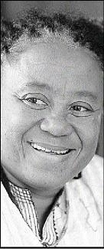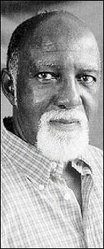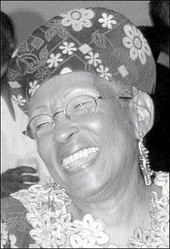



From left, Stines, Morris, Tutu and McCalla Sobers
Mel Cooke, Gleaner Writer
Appropriately, Yvonne McCalla Sobers started with a proverb when she spoke at the Ashanti Restaurant, Hope Gardens, St Andrew, last Sunday afternoon. It fit not only the occasion, the launch of Lifelines: The Black Book of Proverbs, which she has compiled with Askhari Johnson Hodari, with illustrations by Katie Yamasaki, but also the process of putting the book together.
"The fire burns because of the wood gatherers," she quoted. "For about three years Askhari and I were wood gatherers, consciously gathering wood for the fire. Before this we were unconsciously gathering wood," she said.
Hodari could not be at the launch, so McCalla Sobers read a message "from the wood-gatherer you are not seeing today".
Hope and trust
In her message, Hodari said she and McCalla Sobers are sisters, come from the same place, have spirit, hope and trust and have built a 1,000-mile lifeline across the physical distance between them. "Grab hold, you, grab hold," Hodari urged.
Little encouragement seemed to be required for the members of the audience for Bookophilia's first launch outside its building, hosted by Clement Hamilton. Standing on the bridge over calm waters in the middle of the restaurant, which served as a stage, L'Antoinette Stines gave thanks to the ancestors who opened the road so we can read and write. Stines also noted that one proverb in Lifelines had struck her especially, so much so that she had to include it in her thesis, which she was going to submit in a few days.
That proverb is "happiness is dancing when the drumming is good".
Transferring knowledge
Archbishop Desmond Tutu writes the foreword to Lifelines and South African Deputy High Commissioner to Jamaica Matshidiso D. Raphadu said his heart is warmed when people write books, as that is one way knowledge can be transferred from one generation to the next without being obliterated.
He said, though, that there are many African writers, "but the problem is we do not respect them", adding that people quote Shakespeare to show that they are educated. Raphadu encouraged all to have children read "our writers and not just writers from first world countries".
Judith Hamilton read A Different Drummer and Drum Explosion, which had earlier played kumina, delivered extended music worthy of their name.
Rhythmic impact
Professor Mervyn Morris pointed to the organisation of the proverbs by the life cycle, from Birth to Death and Afterlife, each with related sub-sections and assessed that no sub-section seems overly long. "Lifelines is a treasure trove. There is plenty of good sense here, ready to be appreciated and shared," Morris said.
However, he pointed out that, in translation, the music of the proverb can disappear, using a reasonable interpretation of "chicken merry but hawk deh near" ("the chicken is merry but the hawk is near") to illustrate. "There is a huge difference in rhythmic impact," Morris said.
He picked out some and read them for the audience, including "beware of the herbalist whose wife sells coffins" and "when you throw a spear at an elephant, make sure that you do not miss". From the Caribbean comes "orange yellow, but you no know if it sweet" and "God don't always come, but he does send".
"Lifelines is a signal achievement. Lifelines instructs and pleases. Buy the book and grow with it," Morris advised.
McCalla Sobers paid homage to many wood-gatherers, many of whom she grew with at different stages of her life. They included Louise Bennett-Coverley, Mervyn Morris, Lorna Goodison, Dennis Scott, Neville Dawes, Leonie Forbes, Trevor Rhone, Olive Lewin and Joan Andrea Hutchinson.
"Out of the fire comes things like 'Nuh Linger', 'Gully Creeper', 'Luggu Luggu', 'Sweep'," she noted, doing a few dance moves in the process.
McCalla Sobers encouraged all to "grab hold of your lifeline. That's what the proverbs are about".